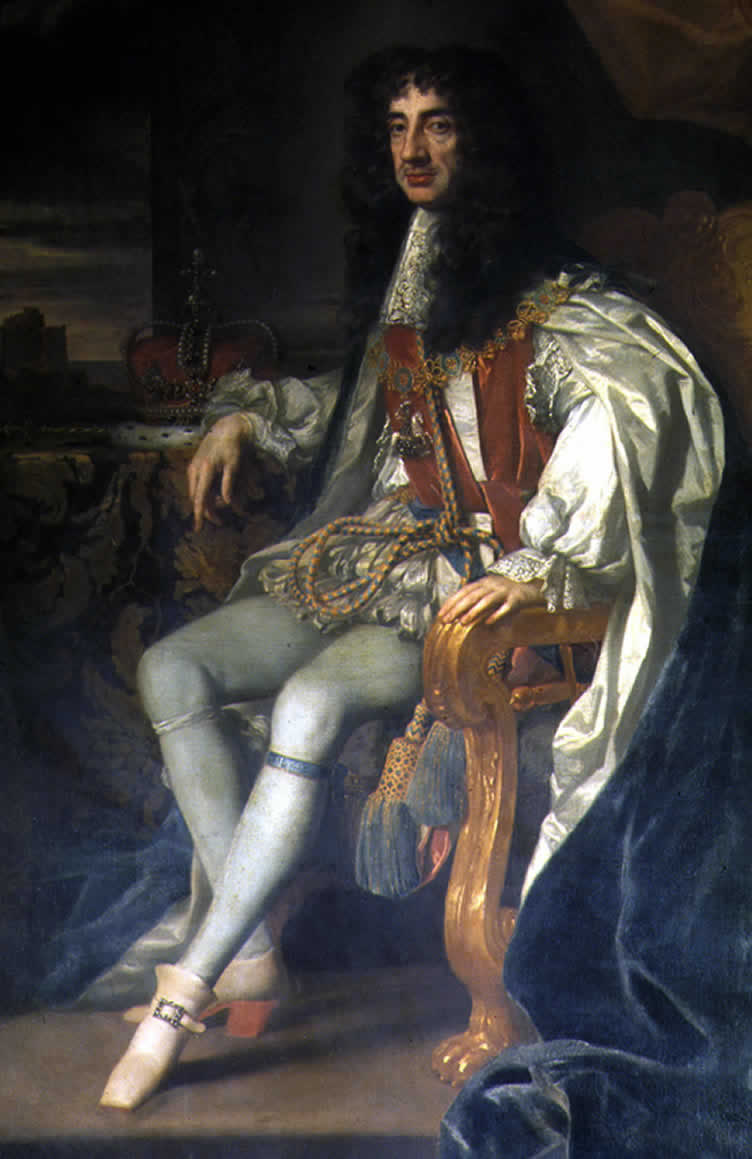 |
| Charles II |
| Source: Georgian era I |
| NAVIGATION: | Index of Dr. Weller's Class Materials | Index of English 341 Materials |
It's a very distinctive age in English history and culture, with beginning and ending dates which mark epochs in the politics of England and Europe: 1660 & 1789
The Beginning Date: 1660: Restoration of the English Monarchy, in the form of this man:
|
Here's an Modern Intro to Charles, which does a lot to explain the change of tone that happened with the Restoration.
And here's the lyrics to the above:
My name is, my name is—Charles the second I love people and the people love me So much that they restored the English monarchy I'm part Scottish-French-Italian, a little bit Dane But one hundred per cent party animal! Champagne? Spaniels I adored, named after me too Like me they were fun with a natty hair-do. Is today my birthday? I can't recall. Let's have a party anyway, because I love a masked ball. All hail, the King, of Bling, let's sing, bells ring, ding ding I'm the King! Who brought back partying! King Charles my daddy lost his throne and kings were banned They chopped off his head, then Olly Cromwell ruled the land Old Olly wasn't jolly, he was glum and he was proud, Would be miserable as sin only 'sinning's not allowed' When Cromwell died the people said 'Charlie me hearty 'Get rid of his dull laws, come back, we'd rather party.' This action's what they called the Monarchy Restoration Which naturally was followed by a huge celebration. The King of Eng-, land say, no sin, to sing, or anything. All say I'm the King who brought back partying. Great London Fire was a whopper In my reign London city came a cropper So this King did what was right and proper Fought the fire, proved I'm more than a bopper I'm a fire-stopper! Married Catherine Braganza, she was a love so true There would never be another, well maybe one or two Lucy Walter, Nell Gwynn, Moll Davis, Barbara Villiers You think that's bad but her name's not as silly as Hortense Manzini As King I must admit I broke the wedding rules But who cares when I brought back the crown jewels? I reinstated Christmas, make-up, sport and even plays; I was the Merry Monarch, they were Good Old Days. When said, and done, King Charles, did run, England, for fun I was the King! Loved by everyone, My song is done. Party anyone?
|  |
All is true, and important to understanding the age and its literature.
--The "Olly" referred to in the rap is Oliver Cromwell:
| English Civil War (1642-1651) Commonwealth of England (1649-53) Protectorate (1653-59) |
--Note the hair
--He was the main force behind the creation of the New Model Army
--Here's a little bit about him from Wikipedia:
After his landing at Dublin on 15 August 1649 (itself only recently defended from an Irish and English Royalist attack at the battle of Rathmines), Cromwell took the fortified port towns of Drogheda and Wexford to secure logistical supply from England. At the siege of Drogheda in September 1649, Cromwell's troops massacred nearly 3,500 people after the town's capture — comprising around 2,700 Royalist soldiers and all the men in the town carrying arms, including some civilians, prisoners, and Roman Catholic priests.[41] Cromwell wrote afterwards that:For the class to consider: Besides the hair, what is the contrast between Cromwell and Charles II?"I am persuaded that this is a righteous judgment of God upon these barbarous wretches, who have imbued their hands in so much innocent blood and that it will tend to prevent the effusion of blood for the future, which are satisfactory grounds for such actions, which otherwise cannot but work remorse and regret."[42]
BACK TO the HORRIBLE HISTORY RAP: "I reinstated Christmas, make-up, sport and even plays"
--Theaters closed in 1642, at the beginning of the English Civil War
--Also see the Wikipedia Page on The Book of Sports
In the early 1640s, as power passed from Charles I (who largely supported the existing rituals and festivals) to the Long Parliament, parliament began the process of clamping down on the celebration of Christmas, pressing that 'Christ-tide' (as they preferred it called, thus doing away with the 'mass' element and its Catholic echoes) should be kept, if at all, merely as a day of fasting and seeking the Lord . . .In January 1645 a group of ministers appointed by parliament produced a new Directory of Public Worship, which set out a new church organisation and new forms of worship to be adopted and followed in England and Wales. The Directory made clear that Sundays were to be strictly observed as holy days, for the worship of God, but that there were to be no other holy days — 'festival days, vulgarly called Holy Days, having no warrant in the Word of God, are not to be continued'.
During the 1650s parliamentary legislation was passed to reinforce the structure that had been put in place by the end of the 1640s. Specific penalties were to be imposed on anyone found holding or attending a special Christmas church service, it was ordered that shops and markets were to stay open on 25 December, the Lord Mayor was repeatedly ordered to ensure that London stayed open for business on 25 December . . .
/////Source:The Cromwell Association: Christmas Abolished!

Religious dogmatism came under attack, not only because of what Cromwell and the Puritan parliments did, but also . . .
|
Literature does not take anything for granted. It satirizes, explores, questions, corrects, so the Restoration-Eighteenth Century forms are satire, the essay, and the comedy of manners.
This contrasts strongly with the forms of the previous era, which were melodramatic, frolicsome, and passionate.